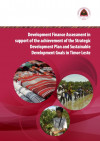The Government of Timor-Leste commissioned a development finance assessment (DFA) to analyse the financing context in the country and identify key reforms that can strengthen public and private financing for the Strategic Development Plan (SDP) 2030.
The SDP represents a broad and ambitious vision that will require investments from a range of public and private actors if it is to be realised. It will require an integrated approach to financing, in which policy, collaboration and partnerships promote public and private finance flows that contribute toward the SDP outcomes according to their specific characteristics.
This report presents the findings of the DFA process. The first section presents a comprehensive analysis of current financing trends in comparison which is followed by analysis of the policy and institutional structures that government uses to engage with financing for the SDP and the SDGs. Following the DFA analytical approach it looks at integrated planning and financing, public-private collaboration, monitoring and review, and transparency and accountability. Finally, it presents a roadmap which outlines the recommendations developed through the DFA process. This section divides between headline proposals that are of the highest importance or respond to a specific opportunity for policy change, and further recommendations that remain important and can be considered for implementation.
The DFA process ultimately aims to build momentum on reforms that can be taken forward and implemented. A core part of this is engaging with a wide constituency of actors who have a stake in financing, and the analysis and recommendations presented in this DFA report have been shaped and refined through extensive consultation across government, the private sector and other stakeholders. In this way, the DFA seeks to demystify financing policy debates, broaden the constituency of actors engaged in these discussions and generate consensus for reform.
